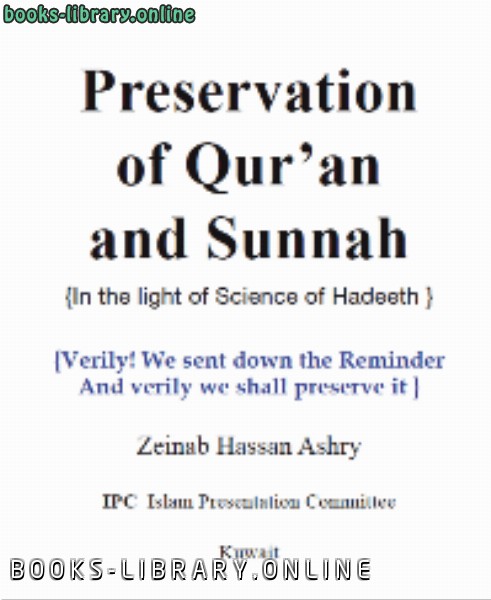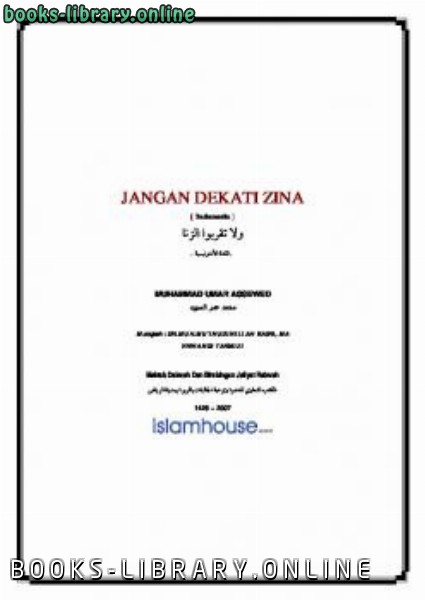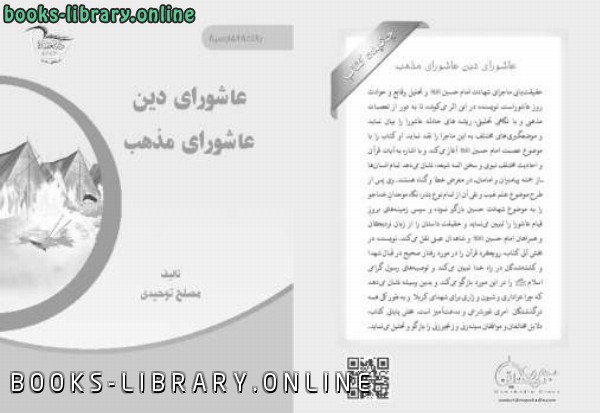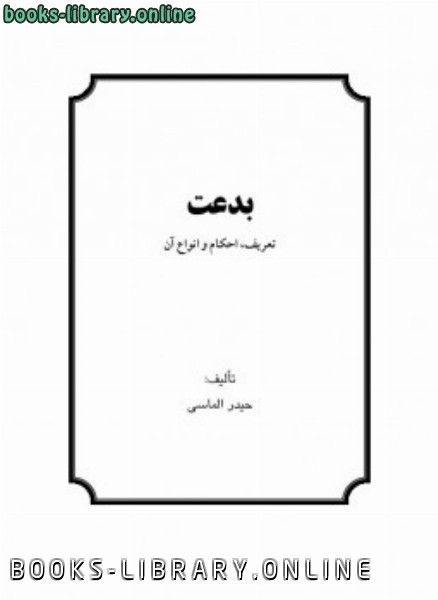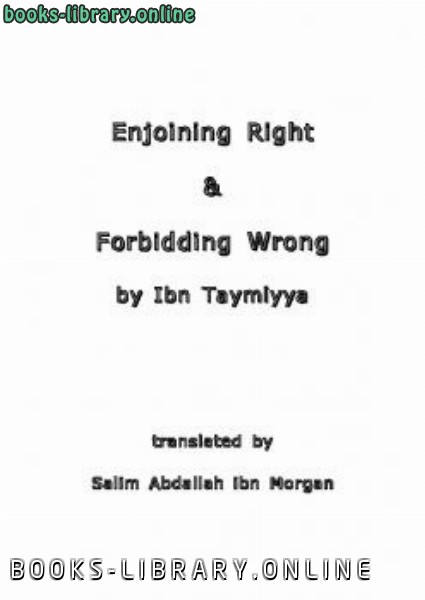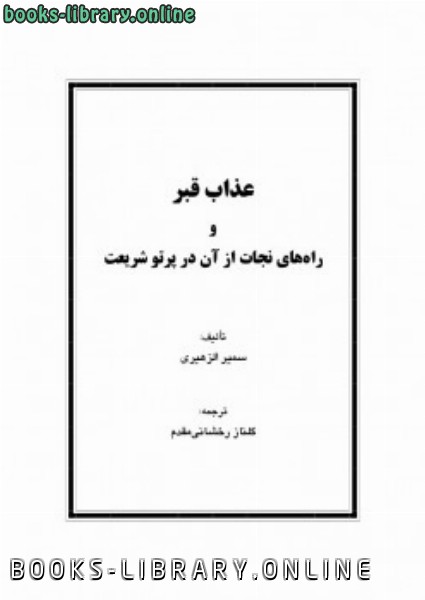كتاب Preservation of Qur’an and Sunnah
I. Hadeeths (Prophet’s traditions) The Hadeeths are records of the prophet’s sayings and deeds as well as the deeds done by any of his companions in his presence or with his knowledge which were either approved of or not disapproved of by him. Examples of Hadeeth i- Sayings of the Prophet Mohammad (pbuh): 1. The Prophet (pbuh) said: “Deeds are by intentions and everybody will be rewarded according to his intentions.” 2. The Prophet (pbuh) said : “Islam is founded on five pillars: to testify that there is no God but Allah and Mohammad is His messenger, to perform prayers, pay Zakat, fast the month of Ramadan and perform pilgrimage.” ii- Deeds of the Prophet Mohammad (pbuh): 1. Acts of prayer 2. Rites of pilgrimage 3. Aisha (the mother of the faithful, may Allah be pleased with her) said, “The Prophet used to wake up at night and clean his teeth with siwak.” 4. It is narrated that the Prophet (pbuh) used to enter the mosque with his right foot first and leave with his left foot first. iii- Deeds that the Prophet (pbuh) approved: 1. There is a tradition reported by Abu-Dawood and Al-Nisa’i that Abu-Saeed Al Khudri said, “Two men lacked water while traveling. They made tayammun (ablutions with clean earth dust) and offered their prayer. After a while they found water. One of them made ablution and repeated his prayer but the other man did not. When they reported the incident to the Prophet (pbuh) he said to the man who did not repeat his prayer, ‘You have been guided to Sunnah’ (approving his conduct) and said to the other, ‘You will be rewarded twice.’” 2. Al-Bukhari narrated that two slave girls were singing on Eid1 day at Aisha’s house while the Prophet (pbuh) was lying down and hearing them. When Abu-Bakr (Aisha’s father) entered the house he rebuked Aisha, saying, “The devil’s instrument in the Prophet’s house?!” The Prophet (pbuh) said, “Let them play. Every people has a feast and this day is our feast” and he let them continue to play. 3. Aisha, may Allah be pleased with her, watched some Ethiopians performing in the prophet mosque in Medina while leaning on the Prophet (pbuh) until they had finished. 1. Festival day Book author :زينب حسن عشري - ❰ له مجموعة من الإنجازات والمؤلفات أبرزها ❞ The Perfect Believer ❝ ❞ Preservation of Qur’an and Sunnah ❝ ❞ THE TRUE MUSLIM ❝ ❞ A Guide to Giving Da’wah To Non Muslims ❝ ❱
من كتب إسلامية بلغات أخرى - مكتبة كتب إسلامية.

قراءة كتاب Preservation of Qur’an and Sunnah أونلاين
معلومات عن كتاب Preservation of Qur’an and Sunnah:
I. Hadeeths (Prophet’s traditions)
The Hadeeths are records of the prophet’s sayings
and deeds as well as the deeds done by any of his
companions in his presence or with his knowledge
which were either approved of or not disapproved
of by him.
Examples of Hadeeth
i- Sayings of the Prophet Mohammad
(pbuh):
1. The Prophet (pbuh) said: “Deeds are by
intentions and everybody will be rewarded
according to his intentions.”
2. The Prophet (pbuh) said : “Islam is founded
on five pillars: to testify that there is no God
but Allah and Mohammad is His messenger, to
perform prayers, pay Zakat, fast the month of
Ramadan and perform pilgrimage.”
ii- Deeds of the Prophet Mohammad (pbuh):
1. Acts of prayer
2. Rites of pilgrimage
3. Aisha (the mother of the faithful, may Allah
be pleased with her) said, “The Prophet used
to wake up at night and clean his teeth with
siwak.”
4. It is narrated that the Prophet (pbuh) used to
enter the mosque with his right foot first and
leave with his left foot first.
iii- Deeds that the Prophet (pbuh) approved:
1. There is a tradition reported by Abu-Dawood
and Al-Nisa’i that Abu-Saeed Al Khudri said,
“Two men lacked water while traveling. They
made tayammun (ablutions with clean earth dust)
and offered their prayer. After a while they found
water. One of them made ablution and repeated
his prayer but the other man did not. When they
reported the incident to the Prophet (pbuh) he
said to the man who did not repeat his prayer,
‘You have been guided to Sunnah’ (approving
his conduct) and said to the other, ‘You will be
rewarded twice.’”
2. Al-Bukhari narrated that two slave girls were
singing on Eid1 day at Aisha’s house while the
Prophet (pbuh) was lying down and hearing
them. When Abu-Bakr (Aisha’s father) entered
the house he rebuked Aisha, saying, “The devil’s
instrument in the Prophet’s house?!” The Prophet
(pbuh) said, “Let them play. Every people has a
feast and this day is our feast” and he let them
continue to play.
3. Aisha, may Allah be pleased with her, watched
some Ethiopians performing in the prophet
mosque in Medina while leaning on the Prophet
(pbuh) until they had finished.
1. Festival day
Book author :
للكاتب/المؤلف : زينب حسن عشري .
دار النشر : .
عدد مرات التحميل : 4021 مرّة / مرات.
تم اضافته في : الأربعاء , 27 مارس 2019م.
حجم الكتاب عند التحميل : 965.8 كيلوبايت .
تعليقات ومناقشات حول الكتاب:
Table of Contents
Chapter One:
Definitions 6
Sunnah 8
Sunnah in Fiqh 10
Bida’ 10
Chapter Two:
Significance of Sunnah 19
Differences between Qur’an and Sunnah 21
The Legality of the Sunnah 29
Objectives of Sunnah 43
Refuting Misconceptions about Sunnah 50
Chapter Three:
Compiling the Qur’an 58
During the Prophet’s Lifetime (pbuh) 61
During the Caliphate of Abu-Bakr (raa) 65
During the Caliphate of Othman (raa) 70
Dots and Vowelization Marks 76
Vowelization Marks 77
Dotting Letters 77
Surahs’s Information 78
Stopping and Continuation Marks 79
Prostration سجود ) Sojood ) Marks 79
Partitioning Marks 79
The Science of Tajweed 79
Chapter Four
Recording the Sunnah 84
4 5
During the Prophet’s Lifetime (pbuh) 84
Role of Sahaba in Collecting Sunnah 90
Compilation of the Books of Hadeeth 96
The end of First Century A.H. 96
The Second Century A.H. 99
The Third Century A.H. 100
The Books of Al-Bukhari and Muslim 101
Major References of Hadeeth 105
Common Hadeeth Terms 107
Chapter Five:
Methods of Classification of the Hadeeth 109
Establishing the Rank of a Hadeeth 110
Classes of Hadeeth according to its substance 115
Calssification according to a particular
authority 118
Classification of Hadeeth with respect to the
number of Narrators 120
Classification of Hadeeth with respect to
its rank of reliability 125
Sources of Saheeh Hadeeth 129
Ranks of Saheeh Hadeeth 130
Unaccepted Hadeeth, Weak or Rejected 134
Degree of weakness 138
The ruling of weak traditions 139
Conditions of acting according to Weak
traditions 140
Sources of Weak traditions 140
Classes of Weak traditions 141
Weakness due to incompleteness of
the chain of narration. 141
Weakness due to the unreliability of the
narrators. 144
Reasons of unreliability of a narrator 144
Classes of weak hadeeth due to
unreliability of the narrators 145
Chapter six
Fabrication of Hadeeth 149
Intentionally Fabricated Traditions 149
Unintentionally Fabricated Traditions 149
Appearance of Hadeeth Fabrication 150
Women and Transmission of Hadeeth 153
Mawdu’ is the Worst Kind of Weak Traditions 155
Al-Karrameyya Opinion 156
Methods of Fabrication 156
Scholars Opinions of Hadeeth fabricators 158
Recognizing Fabricated Hadeeth 160
Reasons for Fabricating Hadeeth 166
Special Books of Fabricated Traditions 174
Impact of Fabricated Traditions on Muslims 176
Conclusion 180
References 182
Test Your Knowledge 183
Books of the Author 189
A word to the respected reader 191
I. Hadeeths (Prophet’s traditions)
The Hadeeths are records of the prophet’s sayings
and deeds as well as the deeds done by any of his
companions in his presence or with his knowledge
which were either approved of or not disapproved
of by him.
Examples of Hadeeth
i- Sayings of the Prophet Mohammad
(pbuh):
1. The Prophet (pbuh) said: “Deeds are by
intentions and everybody will be rewarded
according to his intentions.”
2. The Prophet (pbuh) said : “Islam is founded
on five pillars: to testify that there is no God
but Allah and Mohammad is His messenger, to
perform prayers, pay Zakat, fast the month of
Ramadan and perform pilgrimage.”
ii- Deeds of the Prophet Mohammad (pbuh):
1. Acts of prayer
2. Rites of pilgrimage
3. Aisha (the mother of the faithful, may Allah
be pleased with her) said, “The Prophet used
to wake up at night and clean his teeth with
siwak.”
4. It is narrated that the Prophet (pbuh) used to
enter the mosque with his right foot first and
leave with his left foot first.
iii- Deeds that the Prophet (pbuh) approved:
1. There is a tradition reported by Abu-Dawood
and Al-Nisa’i that Abu-Saeed Al Khudri said,
“Two men lacked water while traveling. They
made tayammun (ablutions with clean earth dust)
and offered their prayer. After a while they found
water. One of them made ablution and repeated
his prayer but the other man did not. When they
reported the incident to the Prophet (pbuh) he
said to the man who did not repeat his prayer,
‘You have been guided to Sunnah’ (approving
his conduct) and said to the other, ‘You will be
rewarded twice.’”
2. Al-Bukhari narrated that two slave girls were
singing on Eid1 day at Aisha’s house while the
Prophet (pbuh) was lying down and hearing
them. When Abu-Bakr (Aisha’s father) entered
the house he rebuked Aisha, saying, “The devil’s
instrument in the Prophet’s house?!” The Prophet
(pbuh) said, “Let them play. Every people has a
feast and this day is our feast” and he let them
continue to play.
3. Aisha, may Allah be pleased with her, watched
some Ethiopians performing in the prophet
mosque in Medina while leaning on the Prophet
(pbuh) until they had finished.
1. Festival day
II. What is Sunnah?
The Arabic word sunnah has several meanings,
one of them being a way of living or a way of
acting. What is meant here is the collection
of Hadeeth which form the mode of life of the
Prophet Mohammad (pbuh), the laws, characters
and manners related to the Islamic Code.
1) The Sunnah also includes the Prophet’s
personal characteristics and manners that form a
part of the Islamic code. For example,
. Anas (rra) said, “I served the Prophet
(pbuh) for ten years and he never asked me
‘Why did you not do so?’ or ‘Why did you
do so?’.
. Ibn Abbas (rra) described the Prophet
(pbuh) by saying, “He was the most
generous person.”
2) However, Sunnah does not include the physical
description of the Prophet (pbuh). For example,
his hair was somewhat curly; however, it is not
Sunnah to curl your hair to look like the Prophet’s
hair.
3) Also, the Prophet’s preferences for certain food,
clothes, and so forth are not part of the Sunnah,
however, unless they are related to religion. For
example:
i) Breaking fast with some dates is Sunnah
because it has been recommended by the Prophet
(pbuh) and fasting is an act of worship.
ii) Eating food that the Prophet (pbuh) used to
like such as honey, sweets or pumpkin is not a
part of Sunnah. However, if someone prefers
these foods out of love for the Prophet (pbuh),
he will be rewarded for it.
4) The Sunnah, however, also does not include the
Prophet’s personal opinions expressed on certain
occasions which do not form a part of the Islamic
Code.
- An example is found in the story of Bareera
(rra) who was a slave girl of Aisha (rra)
and who was set free by her. Bareera was
married to a slave. According to Islamic
law, Bareera, after getting her freedom, she
had the option to keep her marriage with
her slave husband or divorce him. She
decided to divorce him, but he followed her
in the streets of Medina, crying and begging
her to keep him. Her husband sought the
intervention of the Prophet (pbuh) to restore
his marriage. The Prophet (pbuh) called
for Bareera and advised her to keep her
marriage. She asked, “Is this a prophetic
advice from God so that I must obey it
or is it a personal advice?” The Prophet
(pbuh) replied that it was only his personal
advice, so she declined to agree, saying,
“I have no need for him.” The Prophet
(pbuh) later remarked to his uncle Al-’Abas
(rra), “Do you not wonder at how much he
loves her and how much she hates him?”
10 11
Sunnah in Fiqh
Notice that Sunnah in Fiqh has a more specific
meaning; it means the non-obligatory deeds
the prophet used to do; they fall into three
categories:
1. Very highly recommended Sunnah )مؤكدة سنة (
which includes the nonobligatory deeds that
were always practiced by the Prophet (pbuh).
These include the Wattr prayer before sleeping
and the Sunnah prayer before the dawn (Fajr)
obligatory prayer.
2. Recommended Sunnah )مستحبة سنة )which
includes the non-obligatory deeds that were
regularly practiced by the Prophet (pbuh).
3. Optional Sunnah )مباحة سنة (which includes the
non-obligatory deeds the Prophet (pbuh) used
to practice occasionally.
However, the meaning of Sunnah in Fiqh is
beyond the scope of this book.
III. Bida’ بدعة - Innovation in
religious matters
Opposite to Sunnah is Bida’, which is an
innovation in religious matters without any basis
in Islam; it gets no support from the Holy Qur’an,
or the Hadeeth . Bida’ is a deviation from the well
established Sunnah.
Example for Bida’
Extremism even in the acts of worship:
Al-Bukhari narrated that: a group ofthree men came
to the houses of the wives of the Prophet asking
how the Prophet worshipped (Allah), and when
they were informed about that, they considered
the Prophet’s acts of worship insufficient for
them and said, “Where are we from the Prophet
as his past and future sins have been forgiven.”
Then one of them said, “I will offer the prayer
throughout the night forever.” The other said, “I
will fast throughout my life and will not break
my fast.” The third said, “I will keep away from
the women and will not marry forever.” Allah’s
Messenger called for them and said, “Are you the
same people who said so-and-so? By Allah, I am
the most God fearing of all of you; yet I fast and
break my fast, I do sleep and I also marry women.
So, he who turns away from my Sunnah (way of
life) is not from me (not one of my followers).
In some versions, the Prophet (pbuh) said to one
of them, “Your body has a right over you, your
wife has a right over you and your family has a
right over you. So give each one his right.”
Innovation in Matters of this Life
Notice that innovation is relevant only in religious
matters. In matters of the life of this world,
innovation is not considered Bida’ . On the
contrary, Muslims are highly enjoined to outdo
other nations in progress and innovations in all
aspects of this life.
Book author :
 مهلاً !
مهلاً !قبل تحميل الكتاب .. يجب ان يتوفر لديكم برنامج تشغيل وقراءة ملفات pdf
يمكن تحميلة من هنا 'تحميل البرنامج'

نوع الكتاب : pdf.
اذا اعجبك الكتاب فضلاً اضغط على أعجبني و يمكنك تحميله من هنا:


كتب اخرى في كتب إسلامية بلغات أخرى
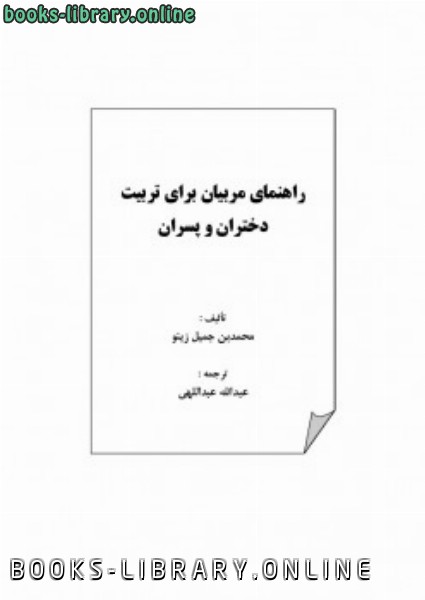
راهنمای مربیان برای تربیت دختران و پسران PDF
قراءة و تحميل كتاب راهنمای مربیان برای تربیت دختران و پسران PDF مجانا
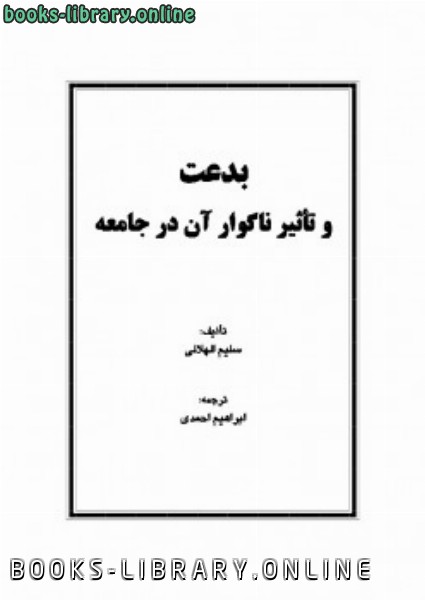
مختصر بدعت و تأثیر ناگوار آن در جامعه PDF
قراءة و تحميل كتاب مختصر بدعت و تأثیر ناگوار آن در جامعه PDF مجانا
